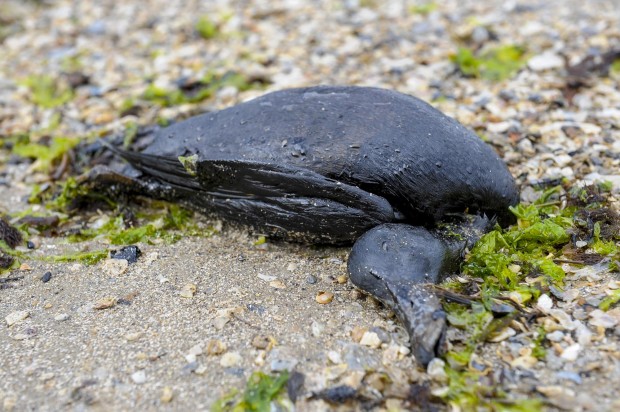We have much more to do and your continued support is needed now more than ever.
Weekly News Roundup: The Latest on the Galveston Oil Spill and More
The Latest on the Galveston Bay Oil Spill
Over the weekend, 168,000 gallons of toxic oil spilled into the Galveston Bay. A Kirby Inland Marine oil barge collided with a cargo ship, shutting down The Houston Ship Channel, and spilling as much as 4,000 barrels of fuel oil. In a story that is becoming all too common, the waterways are still closed and clean up efforts are underway to try to minimize the devastating impact. Read how this disaster could impact wildlife in the area.

What’s happening at National Wildlife Federation this week?
25 Years After Exxon Valdez, A New Crash Fouls Nation’s Waters
March 24- On March 24, 1989, the Exxon Valdez oil tanker ran aground, spilling hundreds of thousands of barrels of crude oil into Prince William Sound. On Saturday, an oil barge collided with a ship in Texas’ Galveston Bay, spilling an unknown amount of oil near important bird habitats as the height of spring migration approaches.
Larry Schweiger, president and CEO of the National Wildlife Federation, responded to this news on the anniversary of one of the nation’s worst oil spills:
“Twenty-five years after the Exxon Valdez crashed into a reef in Prince William Sound, it appears we have not yet learned our lesson. This weekend, a barge collided with a ship in Texas’ Galveston Bay, spilling an unknown amount of heavy oil and threatening important habitat for migrating birds.
Take Action! Edit and send a message to the Secretary of Commerce, urging her to make sure BP fines are used to help dolphins and restore their habitat.
Doris Duke Charitable Foundation Awards National Wildlife Federation and Southern Environmental Law Center $1.6 Million Grant for Continued Bioenergy and Wildlife Work
March 27- The National Wildlife Federation (NWF) and Southern Environmental Law Center (SELC) are pleased to announce they have received a three-year grant of $1,162,000 from the Doris Duke Charitable Foundation (DDCF) to support their “Bioenergy, Wildlife and Biodiversity” project, which supports efforts to ensure the sustainability of bioenergy in the United States. The grant renews a previous three-year financial commitment from DDCF that allowed NWF and SELC to make substantial progress elevating climate, wildlife and biodiversity issues into important policy discussions surrounding bioenergy.
This new grant will provide NWF and SELC with the opportunity to build on their efforts to improve the sustainability of bioenergy as it relates to impacts on wildlife and wildlife habitat, especially with regard to biomass sourced from the Southeastern United States. NWF and SELC will also fully engage in the policy processes of the federal government and the European Union to ensure that the true greenhouse gas implications of biomass used for energy are taken into account.
Learn more about NWF’s bioenergy work here.
Rule Will Better Protect America’s Waters
March 25- Today the Obama Administration proposed a landmark rule that will clarify which types of water bodies are protected by the Clean Water Act. Two Supreme Court decisions over the past decade have left about 20 million wetland acres and two million miles of streams at increased risk of pollution or destruction. This proposal would restore protections to many, but not all, of the waters originally protected by the Clean Water Act.
Larry Schweiger, the National Wildlife Federation’s President and Chief Executive Officer, said in response to the Environmental Protection Agency’s announcement:
“This is a huge step forward for protecting America’s waters and wildlife. You cannot tear out a tree’s fine roots and expect it to survive. The streams and wetlands protected by this rule supply drinking water to more than one-third of all Americans. Our rivers, lakes, and bays will be cleaner and healthier once this rule becomes the law of the land.
Sportsmen: BLM improves plan for North Park, but more protection is needed for fish, wildlife
March 24- A management proposal for Colorado’s North Park is an improvement from earlier plans for the important fish and wildlife region and includes some protection for waterways and habitats, but it falls short of the comprehensive, landscape-level approach envisioned by the Interior Department’s oil and gas leasing reforms, a national sportsmen’s coalition said.
The Bureau of Land Management released a proposed resource management plan Friday for the area in north-central Colorado that includes the headwaters of the North Platte River and is home to Gold Medal trout streams and a diverse array of wildlife, including the greater sage-grouse.
It is the first regional management plan in Colorado to include a master leasing plan, one of the key oil and gas leasing reforms announced by Interior in 2010. The public has 30 days to file protests.
Take Action! Tell the Bureau of Land Management to protect the Roan Plateau’s crucial mule deer habitat from drilling.
NWF in the news:
Christian Science Monitor: Galveston oil spill: Does oil boom mean more spills?
“The impacts of oil spills continue long after the TV cameras have gone home,” Larry Schweiger, president and chief executive of the National Wildlife Federation, said in a statement responding to Saturday’s Galveston oil spill. “We can make sure that nothing like this ever happens again by holding polluters fully accountable today and moving the country quickly towards cleaner sources of energy for tomorrow.”
The Brooklyn Paper: Eco-conscious Carroll Gardens school gets green-thumbs-up
The elementary school bagged a Green Flag award from the National Wildlife Federation and eco-minded pupils took full advantage of the opportunity to gab about their planet-cleaning efforts, a school rep said.
ABC News: House Votes to Limit President on Public Monuments
Bill Dvorak, a public lands organizer for the National Wildlife Federation, called the bill “wrong-headed” and said it “should worry everyone who cares about our public lands and sustaining healthy populations of fish and wildlife.”
Bloomberg BNA: Proposed EPA, Corps Rule Clarifies Federal Jurisdiction Over Waters, Wetlands
“By protecting the streams that feed into mighty rivers like the Mississippi and the wetlands that filter pollution from the Puget Sound and other iconic waters, this rule is a safety net for all the waterways Americans care about.”
Charlotte Observer: Backyard Wildlife: Water feature welcomes wildlife
For more tips, check out the National Wildlife Federation’s primer, “Build a Backyard Pond,” athttp://nando.com/f4.
The Hill: Feds Hunker Down on Protections of Streams and Wetlands
“This proposal clarifies which waters are — and which are not — protected by the Clean Water Act. It will protect streams and wetlands that are currently in legal limbo,” said Larry Schweiger, president of the National Wildlife Federation, in a statement.
Houston Chronicle: Study Planned on Adapting to Changing Water Levels
Others said such a project would cost hundreds of millions of dollars and might have negative consequences such as damaging fish spawning areas or causing flooding elsewhere. More scientific evidence is needed to judge whether it’s a good idea, said Andy Buschsbaum of the National Wildlife Federation.
























